- Home
- Steven Brust
The Phoenix Guards Page 3
The Phoenix Guards Read online
Page 3
Khaavren nodded. “We also spent the evening well. Are you traveling, as we are, all the way to Dragaera City?”
“Indeed we are,” she said. “We have accepted positions in His Majesty’s Diplomatic Service.”
“Ah,” said Khaavren. “How fortunate.”
“Indeed,” said Nylissit. “It is fortunate. My cousin was acquainted with His Majesty some years ago.”
“That is splendid,” said Khaavren. “We, also, intend to serve His Imperial Majesty, by becoming part of the force of city guards, or the Rovers, or perhaps the army itself.”
“Indeed?” she said. “And yet, none of you are of the House of the Dragon.”
“So much the better,” said Khaavren, and he explained his reasoning, aided now and then by a comment from Tazendra, and this quickly passed on to a discussion of the affairs of the day and predictions about the Reign of the new Emperor. Thus they passed the first stage of the journey in amiable companionship among the three of them, while Aerich silently watched the countryside, and Hrivaan dozed.
They stopped at an inn along the highway for the afternoon meal of corn-bread and the local kethna sausages, which were bland but satisfying. During the meal, the couple left for a walk around the inn to observe the countryside, giving Khaavren the chance to ask Aerich what he thought of their two companions.
“What do I think?” said Aerich. “It is odd that you ask. What do you think?”
“Well, I think they are very odd for Issola.”
“Ah, and what makes you think so?”
“As for him, what Issola would sleep rather than converse pleasantly with strangers?”
“Well taken,” said Aerich. “And her?”
“As for her, well, did you not observe some moments ago, that a single strand of gold hair peeked out from beneath the brown?”
“No, I did not observe this, good Khaavren. You have keen eyes.”
“Speaking of eyes,” said Tazendra.
“Well,” said Khaavren. “Speaking of eyes?”
“Did you happen to notice the eyes of the gentleman, when he first opened them as we stopped here?”
“No,” said Khaavren. “What of them?”
“Well, when he first opened his eyes, I should have thought they were of a golden color, such as one sees in those of the House of the Phoenix, or in certain paintings rendered by artists who wish to show purity of character without concern for accuracy.”
“Yet,” said Khaavren, “I had thought I perceived that his eyes were brown.”
“Indeed yes,” said Tazendra. “That is why I was startled. And, to be sure, when I looked a second time, they did seem brown. And yet, at that same moment, I heard the sound emitted by my amulet when in the presence of sorcery.”
“Well,” said Khaavren to Aerich, “what do you make of it?”
“What do I make of it?” said the Lyorn. “Only this: any sorcerer can change the color of his eyes, and anyone can wear whatever clothing he chooses, and anyone can wear a wig, and anyone can wear a ring. But only a Phoenix can carry that air of majesty which I observe in both of them.”
The discussion was interrupted at this point by the return of the couple in question. Shortly thereafter the Teckla coachman emerged from the kitchen wiping his face on the sleeve of his dirty black tunic, and they set off again. The meal seemed to have thoroughly refreshed the one who called himself Hrivaan. They continued the conversation as if there had been no interruption, aided this time by Hrivaan contributing his own ideas on the upcoming Phoenix Reign. “We who serve the Emperor,” he said, “must be strong from the very beginning, to hold back the darkness as long as possible.”
“Come now,” said Khaavren. “You speak of some darkness?”
“I do indeed,” said the other.
“Tell me what it is, then.”
“Why, simply this: is His Imperial Majesty not of the House of the Phoenix?”
“He most certainly is.”
“And does not the Phoenix represent both rebirth and decay?”
“Well, yes, it does.”
“And is it not the case that every Phoenix Emperor except Zerika the First, who founded the Empire, grew decadent, and began practicing evil arts, and neglecting the Empire, until at last he was removed by the turn of the Cycle and the arrival of the Dragon?”
“Well, that seems to be true.”
“And is this not the eighteenth time the House of the Phoenix has taken the Orb? That is, the first time after a complete Cycle?”
“It is indeed.”
“Well, then, it seems clear that we can expect this Emperor to act as all the others have, if not even more so, and that the Empire will be neglected, and nearly fall into ruin.”
“You think so? Perhaps, as we start a new cycle, we will have a Phoenix Emperor much like the first, of whom no ill can be spoken.”
“Well, you may be right, but I think it likely that the end of this Phoenix reign will, in fact, be worse than any other in our long history.”
“And, if it is?”
“Then it is our task, we who serve His Majesty, to hold back the darkness as long as we can.”
Before Khaavren could speak, Aerich stirred himself from the window and said, “Sir, you are nearly correct.”
“Ah, you say, nearly.”
“Yes.”
“But then, have I erred in some way?”
“A small but significant way, my lord.”
“Well, tell me what it is.”
“You said that we serve the Emperor.”
“And if I did?”
“We do not.”
“We do not?”
“No.”
“But, then—”
“Rather, we serve the Empire. The distinction is small, but, you perceive, important.”
Hrivaan frowned, as if this method of thinking were new to him, but Nylissit laughed. “Well spoken, good Lyorn. You reason like an Athyra, yet speak like a Dragon, straight to the target, all the more appropriate as we now begin the reign precisely between those two Houses.”
Aerich bowed his head to acknowledge the compliment. “Spoken,” he said, “like an Issola.” If Khaavren noticed the hint of irony in this speech, it was only because he was looking for it, and had come to know the Lyorn’s moods rather well for the short time they had known each other.
A certain amount of time elapsed then in which no one spoke. During this interval, Khaavren happened to notice Tazendra who, after the change in seating which followed the meal, was sitting next to the window, as well as next to Khaavren, who can thus be seen to have been in the middle, well situated to observe the Dzur, who was, in turn, well situated to observe the fields and meadows of Sorannah slowly pass by. After this interval, Khaavren remarked, “My good Tazendra, I believe I heard you sigh.”
“Well, and if I did?”
“It is, if I am not mistaken, the third time you have done so in these last few minutes.”
“Perhaps it is.”
“Tell me, then, for I am curious, why you are sighing.”
“It is only that this is the first time I have left my home, good Khaavren, and I believe that I shall miss the spinetrees, and the song of the follow-me, and the candlebud, which grows nowhere else.”
During this speech, with which Khaavren was in full sympathy, as similar thoughts had crossed his mind several times since he’d left home, he happened to notice that Nylissit gave a small start, as if pricked by a needle carelessly left by a handmaid, and, at the same time, Hrivaan had suddenly placed his hand against his chest, as if to assure himself that it remained adjoining to his shoulders, or, thought the Tiassa, as if to assure himself that something concealed within his cloak was still in its place. Khaavren pretended not to have noticed, however, and contented himself with murmuring sympathetically to Tazendra.
He considered the words which had caused the simultaneous reaction in his fellow-travelers, and decided that it was upon the mention of the word “candlebud” t
hat the reaction had occurred. Now Khaavren was also from this general region, which was the only area where candlebud could then be found; he therefore turned at once to the two of them and said, “Have you, perchance, ever seen the candlebud? It is a small flower, yet remarkable in its own way.”
“Why, no,” said Nylissit coolly. “I have never seen one.”
“It grows only on the eastern slope of a hill or valley,” said Khaavren, watching them carefully. “And always near running water, though never too near. The stalk is pale green, and rises to the height of a man’s knee. In the fall each plant produces small, purple berries, tart and full of juice. Yet what is remarkable, my friends, is the color. For at the top of each plant, in the early spring, is a small bud that is bright yellow in the morning, and changes, as the day grows older, to orange, and at last to a shining red. But that is not all, for when darkness is full, the bud gives off a light of its own, so that there are whole valleys that shimmer in the night, and are so well lighted one can find the small paths left by the antelope and the tsalmoth. It is a shame that we have no more time here, for they are just now in bloom.”
“A most remarkable flower it must be,” said Hrivaan. “But come, it can not be the only unusual feature of this region. What else grows or lives here that is worthy of mention?”
This led them off to a discussion of the history and character of Sorannah, which occupied the rest of that day’s journey, and continued well into the next day. During the subsequent hours, while they spoke together of many things, as good travelers ought, they never came back to the subject of the candlebud, nor did Hrivaan or Nylissit ever speak of their own history.
Chapter the Third
In Which, Upon Arriving in Dragaera City,
We are Introduced To a Notable Personage
In the Imperial Guard
THE ACTUAL ARRIVAL OF KHAAVREN, Aerich, and Tazendra in Dragaera City, which occurred early in the morning, was uneventful. They gave courteous farewells to their traveling companions, who, notwithstanding that they seemed to be in a great hurry to be about their business, returned the compliments nearly as well as the Issola they pretended to be.
The coach stopped on a narrow street, and was surrounded by urchins of the House of the Teckla who begged driver and passengers for coins. On this occasion they were disappointed, as the driver chased them away before any of the travelers could bring forth whatever alms they might have wished. When the urchins and the supposed Issola were gone, Tazendra and Khaavren took a careful look around. On one side of the street were small structures of wood and stone, most of which appeared to be homes for two or three families, save for one that displayed the Nut and Raisin emblem of the grocer. On the other side the buildings were taller and darker, and made of brick, and one of these claimed to be an inn.
“The Imperial Palace,” said Aerich, “is this way.”
“Good,” said Khaavren. “Let us adjourn thither, for I tell you plainly that arriving thus, a full week sooner, due to your courtesy, than I had thought to, has only increased my desire to enter the Guard as quickly as possible.”
Without another word, then, they set off, taking up most of the middle of the street, Khaavren with his arms linked with Aerich to his right and Tazendra to his left. They were nearly marching as they stepped through the long, winding street. On either side of them, inns, shops, and houses appeared, though Khaavren noticed at once a lack of any facilities for horses, which, as he subsequently learned, were forbidden to be stabled near the Imperial Palace, because of the odors they produced and the pests they attracted.
Most of the structures in this area had been built while the Idyllic School of the House of the Vallista was in fashion, as one could see from the semicircular archways, the wide, enclosed courtyards, and the impossibility of determining what was a carefully hidden support as opposed to a decoration. Furthermore, as they came closer to the areas of the city dominated by the Imperial Palace, they began to notice that there were no wooden buildings to be seen, but rather, everything was of carefully wrought stone. Khaavren looked around in wonder until, while passing a large, white building which proclaimed itself The Campaigner, he felt his arm grasped by Aerich, which he took as a signal to halt, and which signal he simultaneously passed on to Tazendra.
“Yes?” he said to Aerich.
The Lyorn made a gesture, then asked Tazendra, “Is that he?”
She leaned forward. “Kieron’s Boots, I think it is.”
“Who?” asked Khaavren. “The small fellow holding a gold cloak, and speaking to the Chreotha?”
“The very one,” said Tazendra.
“Well?” asked Aerich.
“Let us hail him,” said Tazendra.
“Yes, indeed,” said Khaavren.
“Very well,” said Aerich.
They quickly approached him. But, as they came near, he happened to turn away, so he didn’t see them. When they were close by, they could hear him speaking in a firm but pleasant voice. “My dear lady,” he was saying to the Chreotha, “regulation cut is all very well, to be sure, but I have no doubt that you perceive that a half-cloak, coming only to the tops of my thighs, would but ill suit my physique. Now, I beg of you, make it only a little longer, and I promise you that no harm will come of it. On the contrary, my Captain will be delighted that his Guard is looking well, for it is certainly a poor reflection on him for one of his regiment to stand out unpleasantly. You see my logic, do you not?”
“My lord,” she said, “you argue most convincingly. But I assure you that I have been told, and in the strictest terms, to—” She stopped then, not from seeing the approach of the three friends, but because of the sound of coins clinking on the table in front of her where she sat before the building she shared with several other merchants, artisans, and mendicants who served the Imperial Palace in varying capacities.
The worthy Chreotha stopped, as we have said, and cleared her throat. “Well, after all,” she said, “if you can promise me—” This time she did, in fact, stop because she had caught sight of the three friends approaching her. Seeing her glance over his shoulder, the other turned around, and Khaavren saw a young man who, while small, appeared to be perfectly proportioned. His face, in addition, was regular and handsome, with wide-set blue eyes and a well-formed nose. He was dressed in a marvelous tailored silk doublet of white, with lacing around his small, delicate hands. He wore hose and pantaloons of black, and tall, shiny white boots with pointed toes. His doublet was embroidered with black and red abstract designs. He bore a sword of medium length and weight, with the bell guard that has been called the “dueler’s grip,” and a ruby set into the hilt.
He bowed to Khaavren, Aerich, and Tazendra, showing no sign of embarrassment. His bow, moreover, was graceful, left foot forward and right hand nearly touching the ground while his eyes remained on the faces of the companions. While he did not, as we have said, show any embarrassment, the Chreotha more than made up for this lack by flushing and stuttering enough for several court functionaries.
“A good day to you,” said the Guardsman. “I believe I have seen two of you before, in the village of Newmarket, have I not?”
They nodded. “I am Aerich, and this is the lady Tazendra, and the Marquis of Khaavren.” They bowed in turn, and he acknowledged.
“I am Pel,” he said. Khaavren had, by this time, learned to watch Aerich whenever an introduction was made. He was rewarded in his vigilance by seeing the tiniest furrow cross the Lyorn’s brow. Pel continued, “What brings you to the city?”
“Why, the same thing that brings you,” said Tazendra carelessly.
“You must excuse me if I fail to understand your meaning,” said Pel. Khaavren was certain there was a tension apparent in Pel’s face and voice as he said this.
“Why,” said the Dzurlord, “to join the Guard.”
“Ah!” said Pel, his expression clearing. Khaavren glanced at Aerich. They caught each other’s eyes for a moment, and Khaavren knew that Pel’s reac
tion had not been missed by the sharp-eyed Lyorn. “That falls out well enough,” said Pel. “For I am fortunate enough to be on tolerably good terms with G’aereth, who is a captain, and is just now looking for recruits to fill his posts. I should be happy to introduce you. Now, two of you,” he indicated Aerich and Tazendra, “I know to be excellent companions, from having seen you at play but two days ago. And as for you,” he nodded to Khaavren, “I must say that your face pleases me. So if it is agreeable to join the regiment in which I have the honor to serve, it is as good as settled.”
They quickly agreed to this, whereupon Pel smiled and turned back to the Chreotha, who had recovered and was patiently awaiting the end of the conversation. “Come, now,” said the Guardsman. “I will return for this cloak two hours after noon. I think you can have it ready by then, can you not? I’m certain I can have still more business for you, if you do.”
For a moment, the Chreotha flushed with embarrassment, but the thought of preparing uniforms for three more Guards apparently decided her and she agreed.
“Come then,” said Pel, “and I’ll lead you to the captain.” So saying, he began walking down the street. The three companions followed. Tazendra caught up to him, and they began talking as they walked. Khaavren dropped back and made a sign for Aerich to do the same. When the latter did, Khaavren spoke to him in a low voice.
“I could not help but notice, my friend, that you started when our friend gave us his name.”
“Well,” said Aerich. “And if I did?”
“I should be happy to know why.”
Aerich shrugged. “I am a Lyorn, and we are taught all that we need to know of the lines of the Houses. Now, I know very well that there is no ‘Pel’ belonging to the House of the Yendi. Therefore, he did not give us his true name.”
“Ah,” said Khaavren. “But what then? He is a Yendi.”

 Phoenix
Phoenix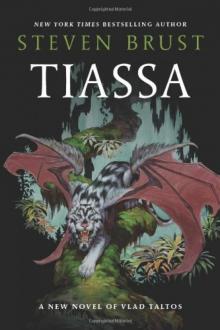 Tiassa
Tiassa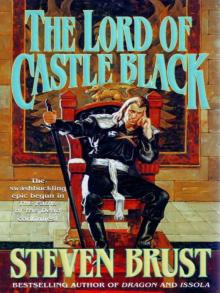 The Lord of Castle Black
The Lord of Castle Black To Reign in Hell: A Novel
To Reign in Hell: A Novel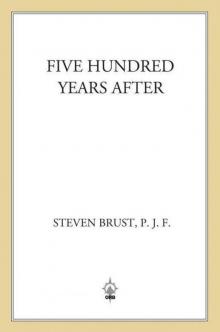 Five Hundred Years After (Phoenix Guards)
Five Hundred Years After (Phoenix Guards) The Book of Dzur: Dzur ; Jhegaala
The Book of Dzur: Dzur ; Jhegaala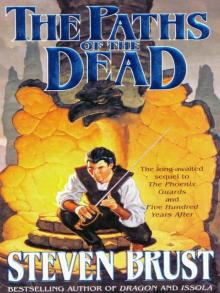 The Paths of the Dead
The Paths of the Dead Jhegaala
Jhegaala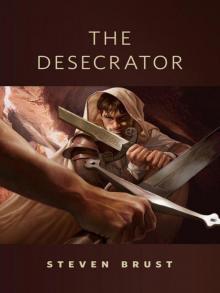 The Desecrator: A Tor.com Original
The Desecrator: A Tor.com Original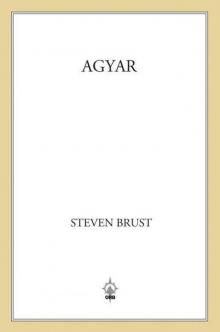 Agyar
Agyar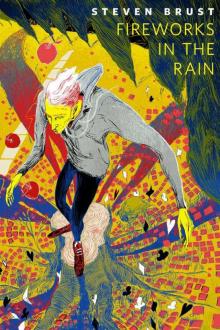 Fireworks in the Rain
Fireworks in the Rain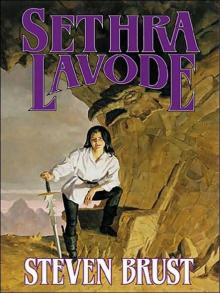 Sethra Lavode
Sethra Lavode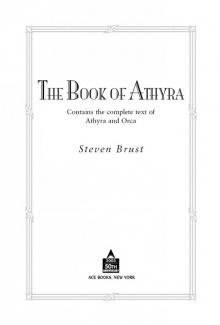 The Book of Athyra
The Book of Athyra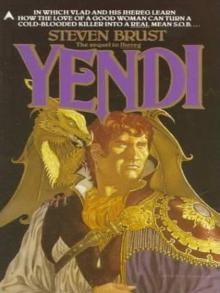 Yendi
Yendi Good Guys
Good Guys The Book of Jhereg
The Book of Jhereg Cowboy Feng's Space Bar and Grille
Cowboy Feng's Space Bar and Grille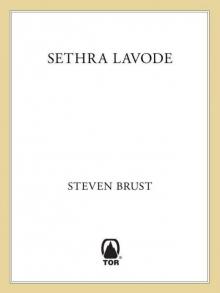 Sethra Lavode (Viscount of Adrilankha)
Sethra Lavode (Viscount of Adrilankha) My Own Kind of Freedom
My Own Kind of Freedom Dzur (Vlad Taltos)
Dzur (Vlad Taltos) The Lord of Castle Black: Book Two of the Viscount of Adrilankha
The Lord of Castle Black: Book Two of the Viscount of Adrilankha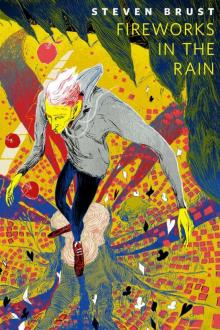 Fireworks in the Rain: A Tor.Com Original
Fireworks in the Rain: A Tor.Com Original To Reign In Hell
To Reign In Hell Issola
Issola Orca
Orca Issola (Vlad Taltos)
Issola (Vlad Taltos)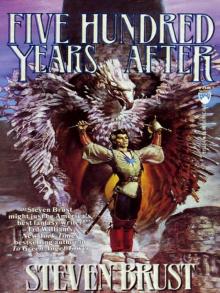 Five Hundred Years After
Five Hundred Years After The Phoenix Guards
The Phoenix Guards Taltos
Taltos![[Vlad Taltos 06] Athyra Read online](http://i1.bookreadfree.com/i1/03/24/[vlad_taltos_06]_athyra_preview.jpg) [Vlad Taltos 06] Athyra
[Vlad Taltos 06] Athyra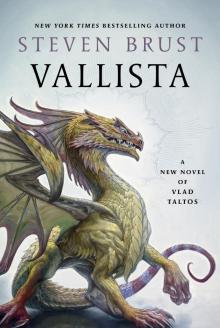 Vallista--A Novel of Vlad Taltos
Vallista--A Novel of Vlad Taltos The Incrementalists
The Incrementalists![[Vlad Taltos 04] Taltos Read online](http://i1.bookreadfree.com/i/03/24/[vlad_taltos_04]_taltos_preview.jpg) [Vlad Taltos 04] Taltos
[Vlad Taltos 04] Taltos![[Vlad Taltos 03] Teckla (v 1.1) Read online](http://i1.bookreadfree.com/i1/03/27/[vlad_taltos_03]_teckla_v_1_1_preview.jpg) [Vlad Taltos 03] Teckla (v 1.1)
[Vlad Taltos 03] Teckla (v 1.1) The Book of Taltos
The Book of Taltos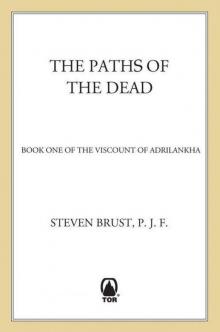 The Paths of the Dead (Viscount of Adrilankha)
The Paths of the Dead (Viscount of Adrilankha) Jhegaala (Vlad Taltos)
Jhegaala (Vlad Taltos)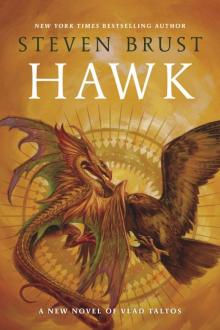 Hawk (Vlad)
Hawk (Vlad)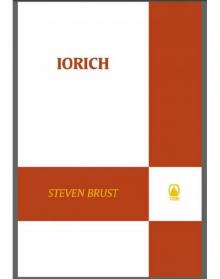 Iorich
Iorich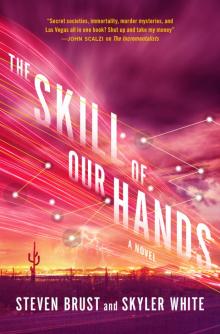 The Skill of Our Hands--A Novel
The Skill of Our Hands--A Novel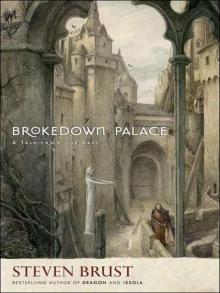 Brokedown Palace
Brokedown Palace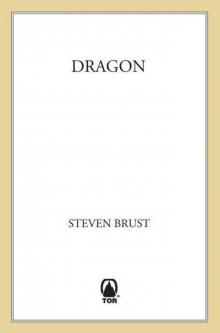 Dragon (Vlad Taltos)
Dragon (Vlad Taltos) Dragon
Dragon Athyra
Athyra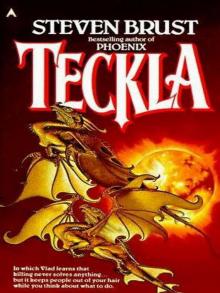 Teckla
Teckla Dzur
Dzur